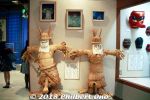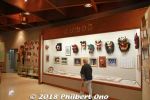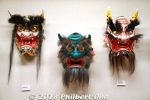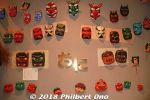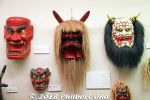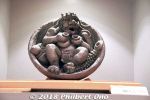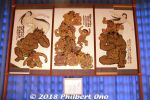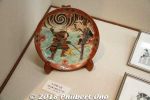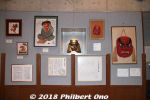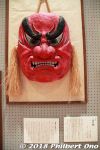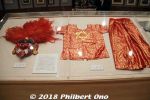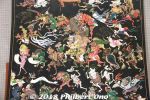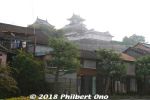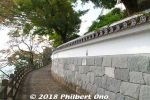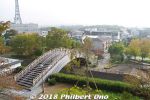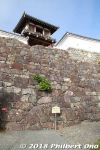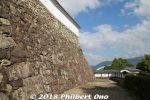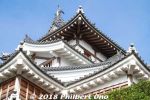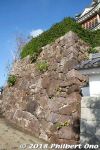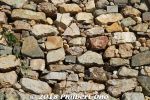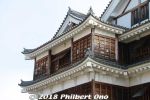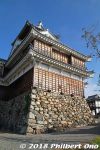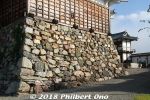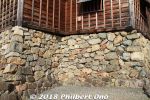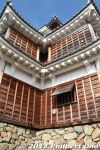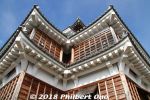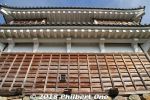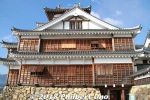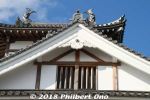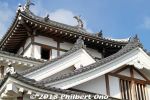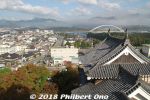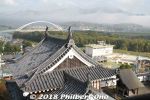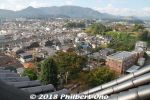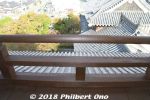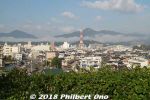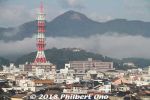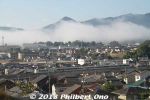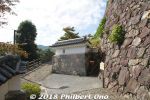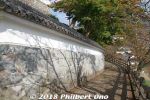 Image search results - "Fukuchiyama" Image search results - "Fukuchiyama" |
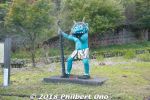
Fukuchiyama also has the Oeyama Mountains, a long mountain range from the neck of the Tango Peninsula to Fukuchiyama. Oeyama is famous for oni (demon, ogre) legends. Near the foot of Oeyama in Fukuchiyama, you may see oni statues like this one.
|
|
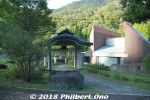
The town wanted to promote itself as an oni town, so it opened the Japanese Oni Exchange Museum in 1993 on the former site of a copper mine at the foot of Oeyama Mountains.
|
|
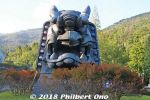
Right outside the oni museum is the world's largest oni-gawara oni roof ornament, 5 meters high, weighing 10 tons. Named "Oeyama Heisei no Dai-Oni." (大江山平成の大鬼).Japanese Oni Exchange Museum in Fukuchiyama, Kyoto Prefecture.
|
|
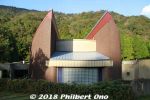
Japanese Oni Exchange Museum exhibits oni (demon, ogre) artwork and local oni legends of the Oeyama Mountains. Masks, statues, kawara roof tile ornaments, and paintings of oni from all over Japan and some from overseas. All donated to the museum. The museum is at the foot of the Oeyama Mountains (大江山). The Oeyama mountains are known for famous oni legends. That's why this museum was built here.
|
|
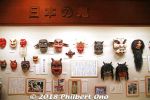
These are oni masks from all over Japan. Very impressive collection of everything oni.
|
|
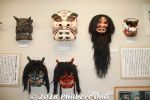
"Oni" has no real equivalent word in English. It's usually a fearsome or hellish figure with negative connotations. It always has horns on the head, but it's not really a devil. Oni are generally perceived to be mean, cruel, evil, or bad luck. So if someone calls you an "oni," it means you're mean, cruel, or always angry. But there may be protective and benevolent ones as well.
|
|
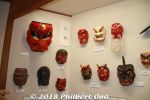
Tengu goblin masks.
|
|
|
|
|
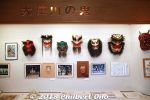
Oni masks based on Oeyama's three famous oni legends, especially "Shuten-doji" (酒呑童子).
|
|
|
|
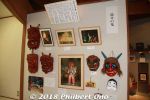
Setsubun oni.
|
|
|
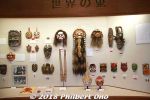
Oni even from overseas.
|
|
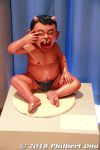
Child demon (バジ鬼) from Bali, Indonesia. Protects children from danger by warning them if they are in danger.Japanese Oni Exchange Museum in Fukuchiyama, Kyoto Prefecture.
|
|
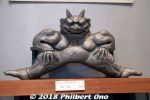
Kawara roof oni ornament.Japanese Oni Exchange Museum in Fukuchiyama, Kyoto Prefecture.
|
|
|
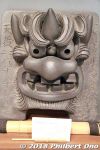
Kawara roof oni ornament. Oni-gawara.
|
|
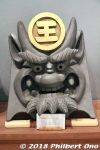
Kawara roof oni ornament. Oni-gawara.
|
|
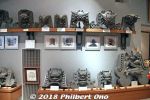
Kawara roof oni ornaments. Oni-gawara.
|
|
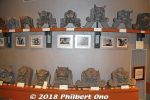
Kawara roof oni ornaments. Oni-gawara.
|
|
|
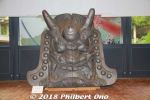
Giant oni-gawara roof ornament.
|
|
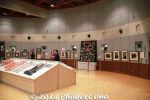
Large exhibition room displaying oni artworks.
|
|
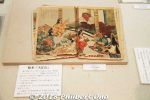
Oeyama oni legend.
|
|
|
|
|
|
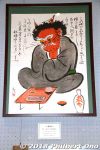
Otsu-e oni painting from Otsu, Shiga Prefecture. 大津絵Japanese Oni Exchange Museum in Fukuchiyama, Kyoto Prefecture.
|
|
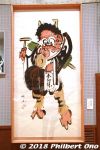
Otsu-e oni painting from Otsu, Shiga Prefecture. 大津絵Japanese Oni Exchange Museum in Fukuchiyama, Kyoto Prefecture.
|
|
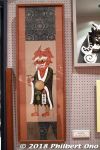
Otsu-e oni painting from Otsu, Shiga Prefecture. 大津絵
|
|
|
|
|
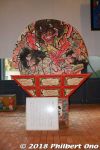
Neputa float from Hirosaki, Aomori Prefecture. From the Neputa Matsuri Festival held in Aug. The float has lights inside and it is lit up and pulled by people during the festival held in the evening.
|
|
|
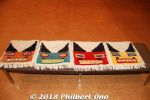
Bench
|
|
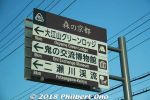
Road directions.
|
|
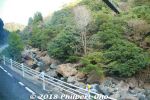
Roadside river near Oeyama Mountains.
|
|

Fukuchiyama Castle was mainly built by Akechi Mitsuhide in 1579 after he conquered this region for Oda Nobunaga.20-min. walk from JR Fukuchiyama Station. Open 9 am–5 pm, closed Tue. and Dec. 28th–31st, Jan. 4th–6th. Map: https://goo.gl/maps/8ZY7HHrDvoC2
|
|
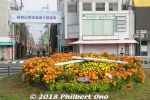
Flower Clock in front of Fukuchiyama Station.
|
|
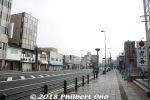
From Fukuchiyama Station, a straight road to Fukuchiyama Castle.
|
|
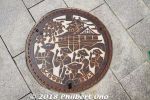
Fukuchiyama manhole has Fukuchiyama Castle and dokkise dancers. In northern Kyoto Prefecture.
|
|
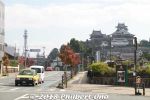
Near Fukuchiyama City Hall, Fukuchiyama Castle in plain sight from the street. Like most other castles, the original Fukuchiyama Castle was ordered to be dismantled in 1873 by the Meiji government.
|
|
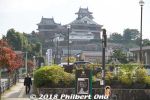
Fukuchiyama Castle's main tower was reconstructed in 1986 funded mostly by donations by the public and subsidies from the Japanese government. Hardly any local tax money from Fukuchiyama was used.
|
|
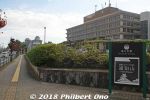
Near Fukuchiyama City Hall, Fukuchiyama Castle.
|
|
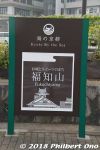
Kyoto by the Sea promoting Fukuchiyama Castle.
|
|
|
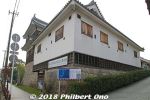
Turn right here. This is the Sato Taisei Memorial Museum, an art museum unrelated to the castle.
|
|
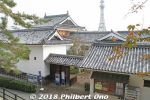
Sato Taisei Memorial Museum
|
|
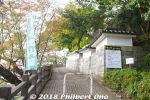
Walk uphill to the castle.
|
|
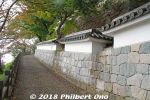
Walk uphill to the castle.
|
|
|
|
|
|
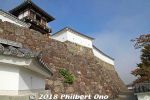
Impressive stone work.
|
|
|
|
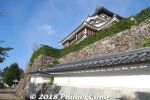
Walk up a little more.
|
|
|
|
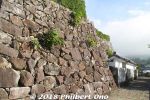
Stone wall of the main castle tower.
|
|
|
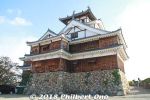
Rear view of Fukuchiyama Castle's main tenshu tower.
|
|

About Fukuchiyama Castle.
|
|
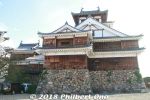
Rear view of Fukuchiyama Castle.
|
|
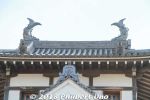
Roof ornaments
|
|
|
|
|
|
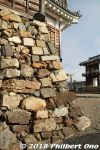
Fukuchiyama Castle is also noted for its stone walls using stones that were originally something else, like gravestones, stone lanterns, and even Buddha stone statues (転用石).Fukuchiyama, Kyoto Prefecture.
|
|
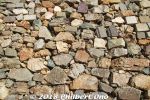
You might think that castle lord did not have enough money to procure enough stones for the walls. Or maybe he was in a real hurry to build the castle and used any stones he could find. In such cases, it would be embarrassing for the lord.
|
|
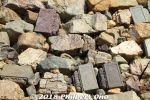
But these unconventional stones have been placed in prominent places so people can see them. So prevailing theory is, these stones (many are upside down) were to show that the castle lord and the local people were working together since only the local people could obtain these gravestones, etc. Gravestones and stone Buddhas also contain ancestral spirits so embedding them in the castle walls give more power to the castle.
|
|
|
|
|
|
|
|
|
|

Front (entrance) view of Fukuchiyama Castle. Inside is a modern building housing a local history museum. Although Fukuchiyama Castle was occupied by a number of lords, it is most strongly associated with Akechi Mitsuhide who built it and occupied it for only three years before he was killed by Toyotomi Hideyoshi in 1582 for assassinating Oda Nobunaga. Fukuchiyama, Kyoto Prefecture.
|
|
|
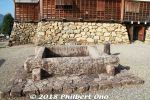
In front of the castle tower is this deep well named Toyo-iwa-no-i. 豊磐の井
|
|
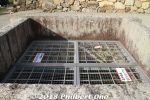
Deep well (50 meters) named Toyo-iwa-no-i. 豊磐の井
|
|
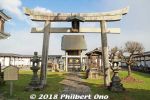
A Shinto shrine next to the castle.
|
|
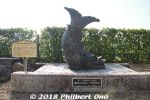
Shachi roof ornament replica of the one on the castle roof.
|
|

About the Shachi roof ornament replica.
|
|
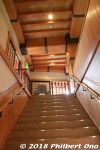
Inside the castle tower is a modern building housing a local history museum. Photography is not allowed inside the castle museum.
|
|
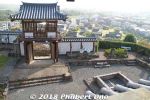
View of the front gate.
|
|
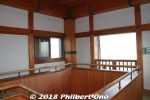
Top floor of the castle tower.
|
|
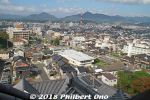
Top floor of the castle tower gives great views of the city. This is toward City Hall and Fukuchiyama Station.
|
|
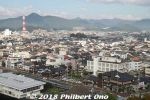
Views from Fukuchiyama Castle.
|
|
|
|
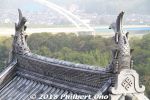
Shachi roof ornaments on the smaller castle tower.
|
|
|
|
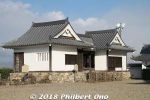
Next to the main castle tower is the Akaganemon Bansho guardhouse that was located next to the Akaganemon Gate east of the city hall. 銅門脇番所
|
|
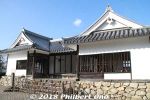
Akaganemon Bansho guardhouse was moved here from its original location. 銅門脇番所
|
|
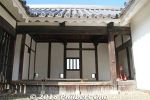
Akaganemon Bansho guardhouse. 銅門脇番所
|
|

About the Akaganemon Bansho guardhouse. 銅門脇番所
|
|
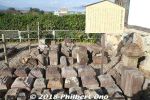
When the castle tower was being reconstructed, they found over 500 of these unconventional stones originally from gravestones, stone lanterns, and even Buddha stone statues. (転用石)
|
|

About Fukuchiyama Castle's unconventional stones. (転用石)
|
|
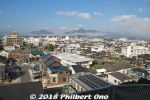
Views of the city from the Honmaru.
|
|
|
|
|
|
|
|
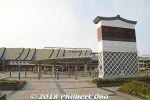
JR Fukuchiyama Station is the gateway to northern Kyoto Prefecture. It is a terminal station for Kyoto Tango Railway, the dominant train network in this area. From Fukuchiyama, you can get to Maizuru, Miyazu, Amanohashidate, and even Toyooka in Hyogo Prefecture. The JR San'in Line also stops at Fukuchiyama.
|
|
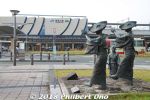
At JR Fukuchiyama Station is this statue of Dokkoise bon dancers dancing to the Fukuchiyama Ondo. This song originated with "Dokkoise!" (ドッコイセ) shouted when local workers had to move something heavy (like the stones for the stone walls) while they were building Fukuchiyama Castle in the 16th century on the order of Akechi Mitsuhide.
|
|
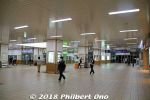
Inside JR Fukuchiyama Station.
|
|
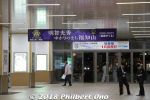
Fukuchiyama is really crazy about its connection with Akechi Mitsuhide. Here's a banner inside Fukuchiyama Station saying "The Town of Akechi Mitsuhide."In 2020, the year-long NHK TV Taiga Drama (「麒麟がくる」) will be about Mitsuhide.
|
|
|
|
|







